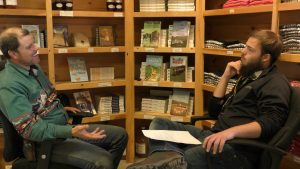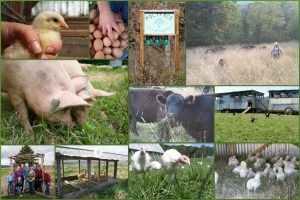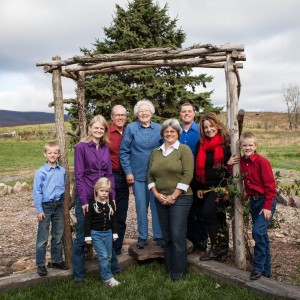Virginia’s agriculture industry is full of businesses built on longevity and strong relationships. T&E Meats, a meat processor located on the northwest side of Harrisonburg, is one such business. T&E has been in operation since construction on the building was completed back in 1939. As the business evolved over the years, it grew to include retail and wholesale enterprises in addition to the core meat-processing business.
In 2007, current General Manager Joe Cloud and Joel Salatin of Polyface Farms purchased T&E and brought its focus back to the USDA-inspected meat processing business. On July 19, Matt Ludwig and I traveled to the T&E plant to talk with Joe about T&E, meat processing, and selling meat products directly to restaurants.
One of the main themes of our conversation was the type of processing that is required for a product to be sold to restaurants. Smaller producers who sell only to individuals typically use custom processing, a simplified method where the meat is processed on an individual’s behalf, but it cannot be resold. To sell in restaurants, via wholesale, or in retail outlets, farmers must have their meat processed under the more rigorous (and thus more expensive) USDA inspection process.
USDA inspection requires more-involved processing and packaging steps, as well as requiring abattoirs to keep an inspector on their staff present whenever the plant is in operation. Inspectors ensure that live animals are treated humanely and are fit for slaughter, that carcasses are fit for human consumption, and that processing facilities are kept in a sanitary condition. Undergoing USDA inspection allows a farmer to access resale channels such as grocery stores, restaurants, and on-farm retail, as well as a greater degree of credibility. Being inspected to one standard or another doesn’t intrinsically improve the value of the meat; good product is still good, and bad product is still bad. However, USDA inspection gives the consumer a more complete idea of how the meat was handled during the processing phase. In addition, USDA inspected meat bears a processor-specific stamp, and sometimes a lot identification number, so that the meat is more easily traceable. In the event of a foodborne illness outbreak, the processor and lot identifier can be used to track down any affected product, resulting in a greater level of food security for the end consumer.
As with other aspects of direct marketing, communication is key when processing meat for sale to a restaurant. One of the incentives for chefs to purchase meat directly from the farmer is so they can have ingredients that meet their exact specifications for the dishes they serve. At T&E, when processing meat destined for a restaurant, they call the chef for specific cutting instructions. The longer they work with a certain chef and a certain farmer, the better they get at processing those animals just as the chef likes it. Joe told us that some chefs will even ask T&E to leave the meat in subprimal cuts (large cuts consisting of large muscle groups rather than individual steaks) so that the restaurant staff can finish the processing of the meat into cuts preferred by their customers themselves. Buying meat directly from the producer has other benefits as well. As Joe points out, small farmers tend to produce meat with more distinctive flavors and textures than that offered by wholesalers. While not all consumers prefer these characteristics, those that do tend to love them, and it can be a good way to distinguish a restaurant’s cuisine from the rest of the pack. Buying directly from the farmer also supports the local economy, makes for better farmer-chef communication, and provides restaurants with a story to tell for each dish.
Joe also noted that his success is directly tied to that of the growers he works with. Although T&E prides themselves on their relationships with their customers, in his 10 years in the meat business, Joe has met his share of processors and farmers who view each other as adversaries. As he told us, “If the farmer doesn’t make money, I can’t stay in business. It’s in my best interest as a processor to help farmers succeed.”
Another major part of T&E’s mission is education. Joe gives tours of the plant by appointment, and he’s worked with groups such as industry members, college students, and homeschool groups. He feels it’s important to show the public not only the work that’s done at a meat processing facility, but that the animal is treated with respect and care throughout the entire experience. The hope is that an educated consumer is an engaged consumer, and that people who know more about their food will tend to buy directly from the farmer more often. An educated public is also better able to interpret the marketing terms used in the food industry, which can make it easier for farmers and restaurants alike to form long-term relationships with consumers who value the same things they do.
We learned a lot about the meat business from our conversation with Joe, and we’re extremely grateful for his generosity with his time and knowledge. To learn more, be sure to catch the full interview with Joe on the Virginia Market Ready YouTube Channel, or learn more about T&E and their services by visiting their website.
Thanks for learning about Virginia’s food systems with us. It’s good to know our food is in good hands.
Ben Garber (Virginia Tech AG Econ ’19)
July 30, 2017
Verona, VA


 That brings me to a point Daniel made in our interview: Polyface is not trying to be the low cost producer, because that wouldn’t work for them. Consider their broilers: it costs them more to raise a chicken to market weight, process it, find a consumer, and deliver that chicken to the consumer than it would for a large, publicly held, vertically integrated poultry company. Part of the difference in cost is due to the differences in production practices, and part of it is due to the fact that Polyface doesn’t have access to the economies of scale that larger producers do. But Polyface has still flourished selling their product for a higher price. Price is a way to communicate value. Farmers looking to enter direct markets should not be hesitant to raise prices if they feel their product is better than competing products.
That brings me to a point Daniel made in our interview: Polyface is not trying to be the low cost producer, because that wouldn’t work for them. Consider their broilers: it costs them more to raise a chicken to market weight, process it, find a consumer, and deliver that chicken to the consumer than it would for a large, publicly held, vertically integrated poultry company. Part of the difference in cost is due to the differences in production practices, and part of it is due to the fact that Polyface doesn’t have access to the economies of scale that larger producers do. But Polyface has still flourished selling their product for a higher price. Price is a way to communicate value. Farmers looking to enter direct markets should not be hesitant to raise prices if they feel their product is better than competing products.